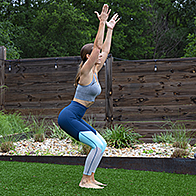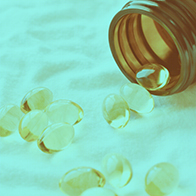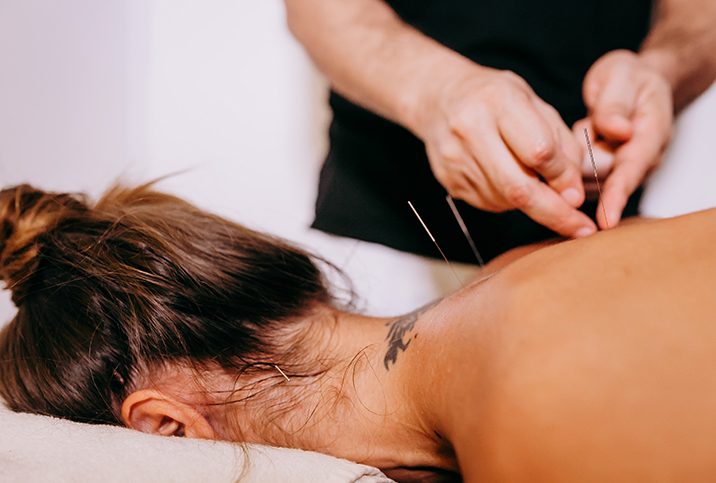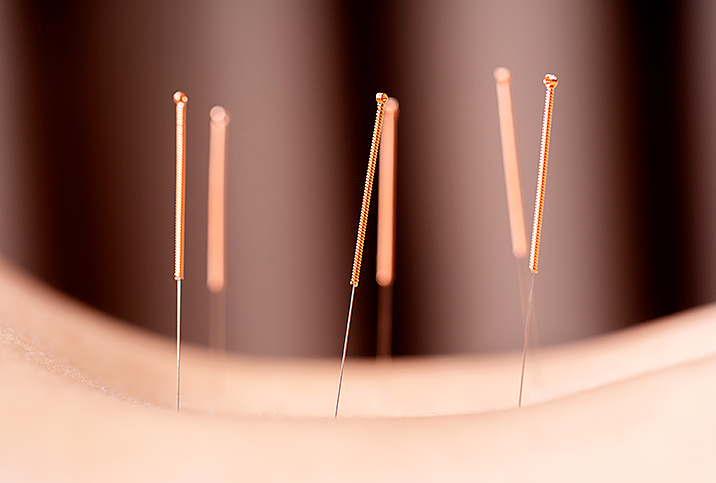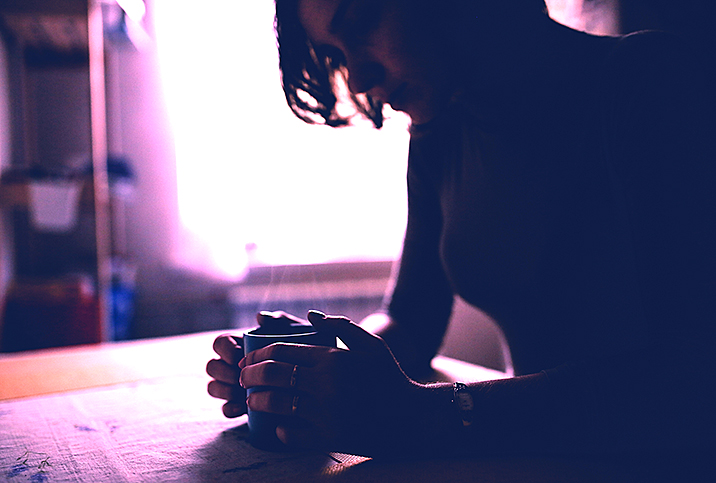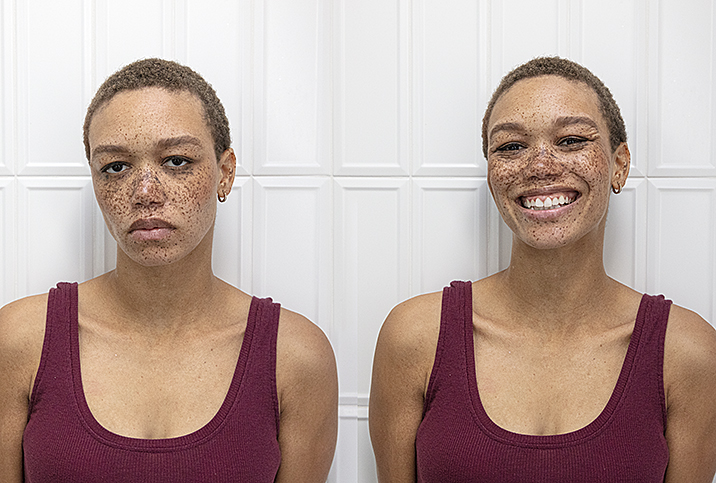Does Acupuncture for PMS Actually Work?
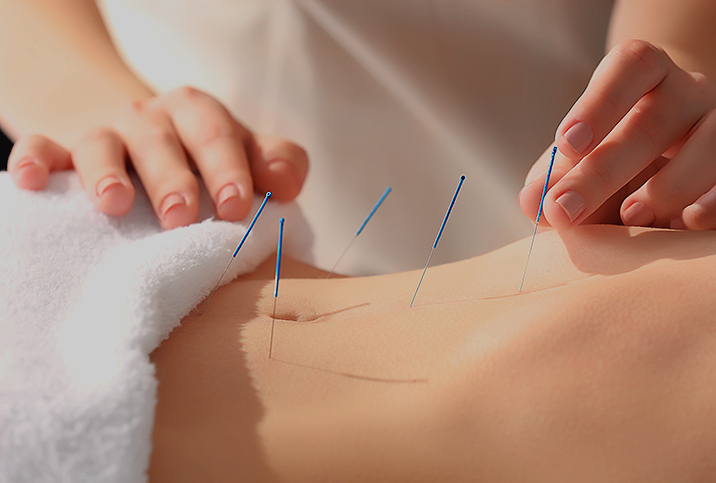
Forty years of this? I couldn't imagine making it through even one more year of my premenstrual syndrome (PMS) symptoms, so I turned to acupuncture.
More than 90 percent of "reproductive-age U.S. women" experience PMS, according to a 2006 study by researchers at the University of Southern California, though anyone who gets a period regardless of gender can experience PMS. By definition, it interferes with functioning in daily life.
I've tried antidepressants, supplements, energy healing, therapy and just plain giving up and taking time off work and avoiding being around people for a few days every month. Nothing has helped my mood swings, irritability or anger that come and go every month that hurt my marriage, my parenting, my work and me. My primary doctor, my gynecologist and my psychiatrist said there's really nothing that can be done.
My therapist was the one to suggest acupuncture to me. I was ready to try anything and booked an appointment that same day.
How does acupuncture for PMS work?
Depending on the symptoms being treated and where in the menstrual cycle the client is, needle placement will be different for every person and every session to affect how the organs related to the reproductive cycle function. "Acupuncture can help to regulate and balance the energy of these organs, leading to a substantial lessening of symptoms," explained Bianca Beldini, DPT, MSOM, L.Ac., a physical therapist and licensed acupuncturist in South Nyack, New York. Even with such different symptoms, between mood changes to physical issues, Beldini said that an acupuncturist sees all symptoms as interconnected.
According to Beldini, from an Eastern medicine perspective, the acupuncture needles are inserted into "specific acu-points along meridian channels to help balance and regulate the Qi, or energy, of the body's internal system." Through a Western lens, "needle stimulation of neural bundles found in the skin, fascia, or muscles (which have a high correlation to acupuncture meridian points) can have an influence over the autonomic nervous system, the involuntary control system that helps to regulate and keep our bodies optimally functioning." That's a lot of medical speak to say that the needles prick certain points that create changes in the body.
'Acupuncture can help to regulate and balance the energy of these organs, leading to a substantial lessening of symptoms.'
In my experience with two acupuncturists, I lie on a massage table (warmed if I want it) in a calm, relaxing room with music playing. I wear loose-fitting and comfortable clothing as instructed, since they may need to reach places like my knees that can't be done if I'm wearing, say, jeans. I explain my complaints and the acupuncturist puts needles in more than a dozen points all over my body, from feet to face. I was nervous the first time that they would hurt (pretty terrified, actually), but I can't even feel them going in. There is almost zero sensation when a needle is stuck in, but sometimes there is a pinch. Sometimes I might need to take off my shirt and bra to lie on my stomach for points on my back.
The acupuncturist leaves me alone for about 20 minutes with the needles in me, and the whole session takes almost an hour. I enjoy the appointments as a calming break from the day.
Is acupuncture for PMS effective?
"Most of my patients come for acupuncture and Chinese medicine after they have tried 'everything else,'" said Tsao Lin Moy, founder of Integrative Healing Arts Acupuncture in New York City. She says many treatments her patients have used before, like hormonal birth control or mood stabilizers, don't work, have side effects or mask underlying conditions.
A handful of studies do show that acupuncture helps several PMS symptoms and does make changes in hormones, though the Western medical establishment is still skeptical. However, a study published in 2019 in "Evidence-Based Complementary and Alternative Medicine" looking at more than 1,100 cases showed acupuncture to be more effective than medicine in treating PMS.
"Acupuncture studies show that acupuncture releases endorphins (the brain's natural opioids) that have a calming effect on the whole body, relieving stress and inflammation," Moy continued. She also sees her patients experience improvement in other health issues, since acupuncture treats the whole body. Beldini says that many of her patients actually come to her for something else and then see positive changes related to their menstrual cycle from the overall treatment.
What should you look for in choosing an acupuncturist for PMS and what should you expect?
Both Moy and Beldini said to only use a licensed acupuncturist who is certified by the National Certification Commission for Acupuncture and Oriental Medicine (NCCAOM). You can find a practitioner directly through the NCCAOM online directory.
How often you should go for acupuncture sessions will vary based on your acupuncturist's recommendation for your specific case, but in general, once per week for three months is the gold standard to see major changes. Going every other week instead of every week can still have a positive effect, but talk to your acupuncturist about what they recommend and how they can work with your budget. Sessions usually last between half an hour to more than an hour, and often cost between $75 and $100, though it varies greatly.
I'm still on my journey toward a better premenstrual time, and I'm in the "it may get worse before it gets better" stage of acupuncture. The changes in my hormones from the first two months of treatment have caused a lot of mood swings, but my acupuncturist feels confident they will even out after one more month. No matter where it ends up, I'll be happy I tried it.







